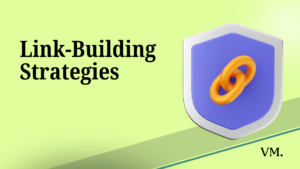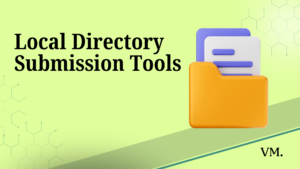Local charity backlinks offer a unique approach to ethical link building by connecting local businesses with non-profit organizations.
These backlinks come from charitable organizations’ websites, which often have high domain authority and trustworthiness, making them valuable for local SEO and overall search rankings.
Key takeaway: Leveraging local charity backlinks not only enhances local link building efforts but also supports meaningful causes, fostering a positive community impact while improving local search results.
In this article, you’ll learn:
- The definition and importance of local charity backlinks for local businesses
- Strategies to leverage local charities for ethical link building
- The SEO benefits of engaging with local community organizations
- Ethical considerations and online resources to find collaboration opportunities
Dive in to discover how combining local link building strategies with social responsibility can create long-term benefits for your business.
Understanding Local Charity Backlinks
What Are Local Charity Backlinks?
Local charity backlinks are hyperlinks from the websites of local charitable organizations that point back to your business website. Unlike other types of backlinks like digital PR that might come from local blogs, local directories, or commercial local sites, these backlinks originate from nonprofit entities dedicated to serving their communities.
This difference is crucial as it often leads to higher quality and more trusted local links.
According to Moz’s Link Building Guide, backlinks from authoritative community organizations carry significant weight in search engine algorithms, particularly for local search rankings.
Why Are Local Charity Backlinks Important for SEO?
Backlinks play a vital role in SEO because they signal to search engines like Google that your site is credible and authoritative. When these links come from sources with high domain authority and trustworthiness, such as reputable charities, the impact on your local search rankings can be substantial.
Research from Search Engine Journal shows that local relevance signals, including links from community organizations, are among the top ranking factors for local search results.
The Benefits of Backlinks from Charitable Organizations
High Domain Authority: Charitable organizations typically have strong domain authority due to their longevity, widespread community support, and frequent mentions in local media outlets and local news sites.
Trustworthiness: These organizations are often perceived as highly trustworthy because they operate transparently and for the public good. Obtaining a backlink from such a source not only boosts your local SEO but also enhances your brand’s reputation among local customers.
Local Relevance: Links from local charities strengthen your connection to the local community, which search engines recognize as a positive local SEO signal.
By aligning with local charities, local businesses can gain powerful backlinks that significantly contribute to their online visibility while positively impacting their community image.
Strategies for Leveraging Local Charities for Ethical Link Building
The SEO Benefits of Engaging with Local Charities Beyond Just Link Building Efforts
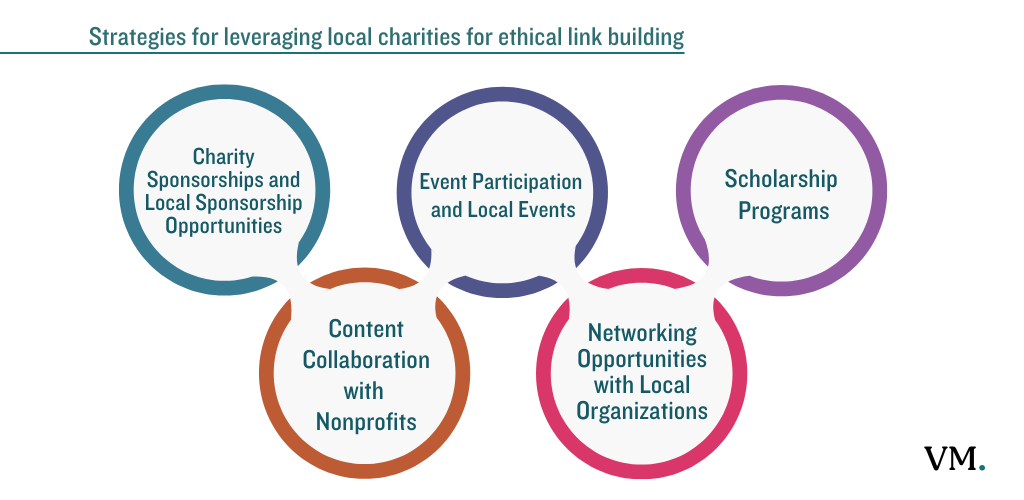
1. Charity Sponsorships and Local Sponsorship Opportunities
Sponsoring local charities or sponsor local events can be beneficial for both businesses and non-profits.
By providing financial donations or support in other forms, businesses can help important causes while also getting valuable backlinks from the charity’s website or event page.
Benefits of Sponsoring Local Charities or Events:
-
Enhanced Brand Visibility: Businesses get featured on the charity’s website, newsletters, and promotional materials, creating referral traffic
-
Community Engagement: It fosters a positive image and builds trust within the local community
-
SEO Advantages: High-quality backlinks from reputable charity websites can significantly boost a business’s search engine rankings
Types of Sponsorships:
-
Financial Donations: Direct monetary contributions to a charitable organization
-
In-Kind Support: Providing products, services, or volunteer time instead of cash
Each type has its unique advantages. Financial donations might lead to more prominent mentions on the charity’s digital platforms, while in-kind support can create lasting relationships and regular mentions as local events unfold.
For example, if a local bakery sponsors a charity run by providing refreshments, they might receive a backlink from the event’s webpage, social media channels shout-outs, and mentions in press releases from local news outlets related to the event.
These backlinks are not just valuable for local SEO but also enhance the bakery’s reputation as a community-centric business among their target audience.
According to the Association of Fundraising Professionals, businesses that engage in consistent community sponsorship see a 23% increase in local brand recognition.
2. Event Participation and Local Events
Participating in or hosting charitable events isn’t just a noble act; it’s a smart, effective link building strategy.
Active involvement in community events can significantly boost your local link building efforts while fostering community engagement.
Opportunities for acquiring backlinks through:
-
Event Pages: When you participate in a charity event, your business often gets mentioned on the event’s official page, creating local backlinks to your own site
-
Local Media Coverage: Charitable events are newsworthy! Local newspapers and local media outlets frequently cover these happenings, providing additional opportunities for backlinks from reputable news sites
-
Community Calendars: Ensure that your event is listed on local websites and community sites. These platforms often have high domain authority and can attract local traffic to your site
Practical Strategies:
-
Host Your Own Event: Create an event around a cause that aligns with your business values. This not only attracts attention but also provides multiple backlink opportunities from various mentions and listings in local business directories
-
Collaborate with Local Nonprofits: Partner with local organizations to co-host community events. This collaboration can lead to shared promotions, increasing the chances of backlinks from both parties’ websites and associated media coverage
3. Scholarship Programs
Creating legitimate scholarship programs is a powerful way to gain backlinks from educational institutions’ websites.
By establishing a scholarship, you not only support students in your local community but also create valuable SEO opportunities.
Steps for Establishing Scholarships:
-
Identify the Purpose: Define the goals and criteria for your scholarship. Align it with your business values and the needs of local schools and community members
-
Set Clear Guidelines: Determine eligibility, application processes, deadlines, and award amounts
-
Create a Dedicated Page: Develop a scholarship page on your business site with all necessary details
Promotion Strategies for Scholarships:
-
Reach Out to Educational Institutions: Contact local schools, colleges, and universities to list your scholarship on their financial aid pages
-
Utilize Social Media: Share details about the scholarship on social platforms to increase visibility among your target audience
-
Press Releases and Local Media: Announce the scholarship through press releases and engage with local news outlets for coverage
Backlink Potential:
Educational institutions typically have high domain authority. When they link back to your scholarship page, it significantly boosts your local link building efforts and helps build local backlinks from authoritative sources.
According to IRS guidelines on scholarships, properly structured scholarship programs can provide tax benefits while supporting community development.
4. Content Collaboration with Nonprofits
Collaborating with nonprofits on content creation is a powerful way to leverage local charity backlinks for ethical link building.
This strategy not only enhances local SEO but also strengthens community ties through shared values and missions.
Why Collaborate on Content?
-
Mutual Backlinks: When local businesses and nonprofits work together on blogs, articles, or research reports, they both benefit from backlinks as the content is shared across their respective platforms
-
Boost Local SEO: High-quality, relevant content from trusted community sources can significantly impact your local search rankings
Types of Content Collaboration:
-
Guest Blogging: Write guest posts for nonprofit websites or invite them to contribute to your local blogs. This exchange of expertise provides valuable information to both audiences while creating local backlinks
-
Joint Articles: Co-authored pieces allow both parties to share insights and link back to each other’s websites, enhancing visibility and authority in the local market
-
Research Reports: Partner with a nonprofit to conduct research on topics relevant to your industry and their mission. Publishing these findings can lead to high-value backlinks from local sites
Practical Steps:
-
Identify relevant nonprofits whose missions align with your business values
-
Propose specific content ideas that provide mutual benefits
-
Promote widely across local directories, social media channels, and other platforms
Research from Content Marketing Institute shows that collaborative content generates 300% more engagement than single-source content.
5. Networking Opportunities with Local Organizations
Building relationships with local nonprofits opens up a treasure trove of networking opportunities with other local businesses and community groups.
Engaging in charity sponsorships, event participation, and scholarship establishment can lead to additional backlink prospects that extend beyond initial collaborations.
Building Community Connections:
-
Chamber of Commerce Involvement: Join your local chamber of commerce, which often partners with nonprofits and can provide insider knowledge about local sponsorship opportunities
-
Local Blogger Partnerships: Connect with local bloggers and local influencers who cover community events and charitable activities
-
Cross-Business Collaborations: Network with other local businesses at charity events to explore mutual linking opportunities
Building these community connections through meaningful interactions ensures that your local link building strategies are both ethical and effective.
As businesses engage more deeply with nonprofits, they uncover new sponsorship opportunities and avenues for partnership.
Engaging with local charities boosts local search rankings through several mechanisms that extend beyond the acquisition of backlinks.
By fostering genuine relationships with community-focused organizations, local businesses can:
- Enhance Local Relevance: Links from local charities signal to search engines that your business is active and relevant within the community. These links often carry more weight in local search algorithms due to their geo-specific nature.
- Increase Brand Visibility: Participation in charitable events or sponsorships often leads to mentions on event pages, social media, and local news websites. This increased visibility helps establish your brand as a community leader, which can indirectly boost your local SEO performance.
- Generate Positive User Signals: Engaging with charities can drive more traffic to your site from local customers who trust and value these organizations. Increased website visits, longer dwell times, and positive engagement metrics can all signal to search engines that your site is trustworthy and relevant.
- Foster Community Engagement: Active involvement in local charity initiatives often results in word-of-mouth referrals and organic mentions across various community websites. These interactions contribute to a natural backlink profile that search engines favor.
- Build Local Citations: Charity involvement often leads to mentions in local business directories, local newspapers, and community sites, creating valuable local citations that support local SEO.
According to Google’s Local Search Quality Guidelines, community involvement is a strong signal of local business authenticity and relevance.
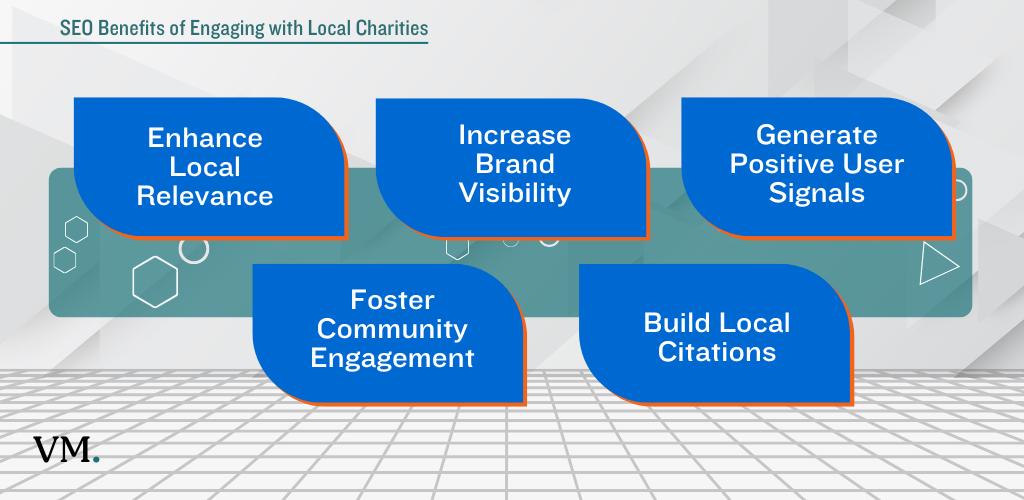
Ethical Considerations When Using Local Charities for Backlink Acquisition Strategies
Ethical link building practices are essential when collaborating with local charities. This ensures a balance between achieving SEO objectives and genuinely supporting charitable causes.
The local business owner should prioritize transparency in their intentions and actions.
Key Points to Consider:
Genuine Support: Ensure that your contributions are meaningful. Whether it’s a financial donation or volunteering time, the support should be substantial and helpful to the charity
Transparency in Intentions: Be clear about your goals from the outset. Let the charity know that while you aim to support them, you also hope to gain backlinks as part of the collaboration
Long-term Relationships: Build lasting partnerships rather than one-off transactions. Long-term relationships foster trust and mutual benefit, enhancing both your business’s reputation and the charity’s mission
Community Impact: Focus on initiatives that have a positive impact on the local community. This not only benefits local residents but also aligns your business with social responsibility values
Avoiding Common Pitfalls:
Don’t neglect broken links on charity websites – offer to help fix them as part of your collaboration
Ensure all sponsored content is properly disclosed according to FTC guidelines
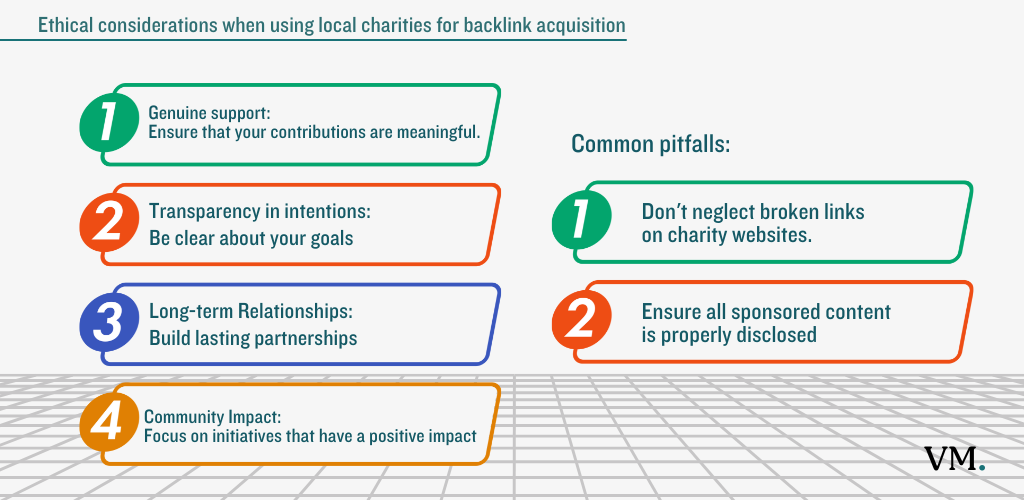
Utilizing Online Resources to Find Collaboration Opportunities Effectively
Finding the right nonprofits to collaborate with doesn’t have to be daunting.
Various online platforms for nonprofits list their sponsors and partners, making it easier for local businesses to identify potential opportunities and build local links.
Online Platforms for Nonprofits:
Charity Navigator: A comprehensive resource that lists nonprofit organizations and their activities. It provides details on their sponsors, making it an excellent starting point for outreach
GuideStar: Offers a database of verified nonprofits, including financials and impact reports. Businesses can use this information to find reputable charities for collaboration
Local Community Websites: Many community-focused websites feature directories of local charities and nonprofit events. These sites often highlight sponsor information, providing direct links to potential backlink opportunities.
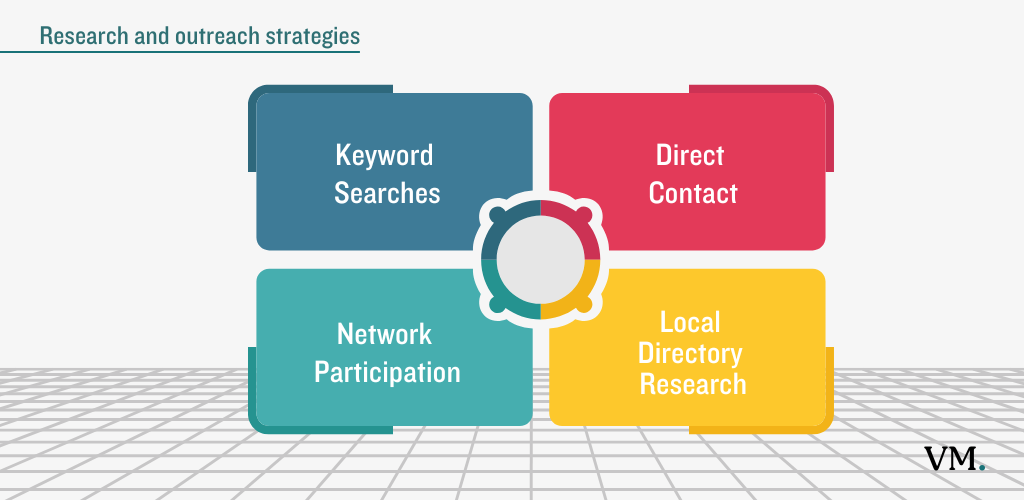
Research and Outreach Strategies:
Keyword Searches: Use keywords like “charity sponsorship opportunities” or “nonprofit partnerships” combined with your local area to find relevant listings and directories
Network Participation: Join local business associations or chambers of commerce that often partner with nonprofits. These networks can provide insider knowledge about upcoming events and sponsorship needs
Direct Contact: Once potential partners are identified, reach out directly through email or social media. Personalize your message to highlight shared values and mutual benefits
Local Directory Research: Check local business directories and community sites for charity listings and sponsorship opportunities
Understanding these resources streamlines the process of finding valuable collaboration opportunities with local nonprofits, enhancing both local link building efforts and community support initiatives.
Summary
Engaging genuinely with community organizations is not just about gaining backlinks but fostering relationships that benefit both your business and the local charities.
By focusing on effective link building strategies that prioritize community impact, you ensure that your efforts are sustainable and positive.
Final thoughts:
Combining local SEO efforts with social responsibility initiatives can lead to long-term benefits, including improved brand reputation and stronger community ties
Creating valuable backlinks through charity partnerships establishes your business as a trusted community member
Building local backlinks through ethical means not only improves search rankings but also contributes meaningfully to your local community
By strategically partnering with local charities and nonprofits, local businesses can achieve a balance between boosting their online presence and supporting worthy causes.
This approach not only uplifts your SEO performance but also enriches your community, demonstrating how ethical practices can effectively generate local charity backlinks.
FAQs
What are local charity backlinks and why are they important for ethical link building?
Local charity backlinks are links from nonprofit organization websites in your area that point to your business website.
They’re important because they come from high-authority, trusted sources that signal to search engines that your business is actively involved in the local community.
How can sponsoring local charities benefit my business's SEO?
Sponsoring local charities can improve your local search rankings by providing high-quality backlinks from authoritative community organizations, increasing local relevance signals, and generating positive mentions across local media outlets and community websites.
What strategies can I use to leverage local charities for ethical link building?
Key strategies include charity sponsorships, participating in local events, creating scholarship programs, collaborating on content creation, and building networking relationships with local organizations and other local businesses.
Why is it important to participate in charitable events for link building?
Participating in charitable events provides multiple backlink opportunities through event pages, local media coverage, and community calendar listings, while also demonstrating your business’s commitment to the local community.
How can I find collaboration opportunities with nonprofits effectively?
Use online platforms like Charity Navigator and GuideStar, search local business directories, join your chamber of commerce, and directly reach out to local organizations whose missions align with your business values to discover local charity backlinks opportunities.
Share:


